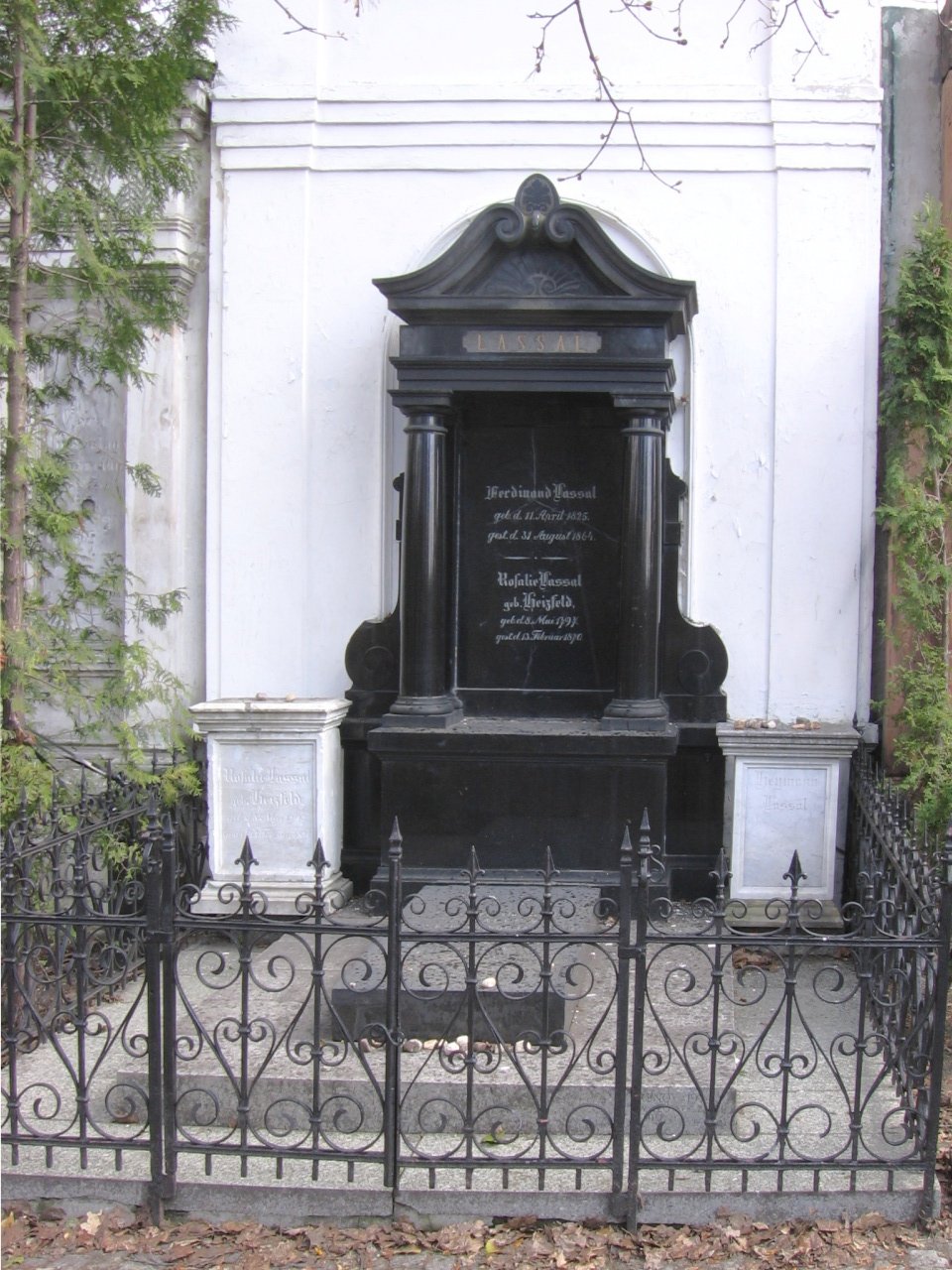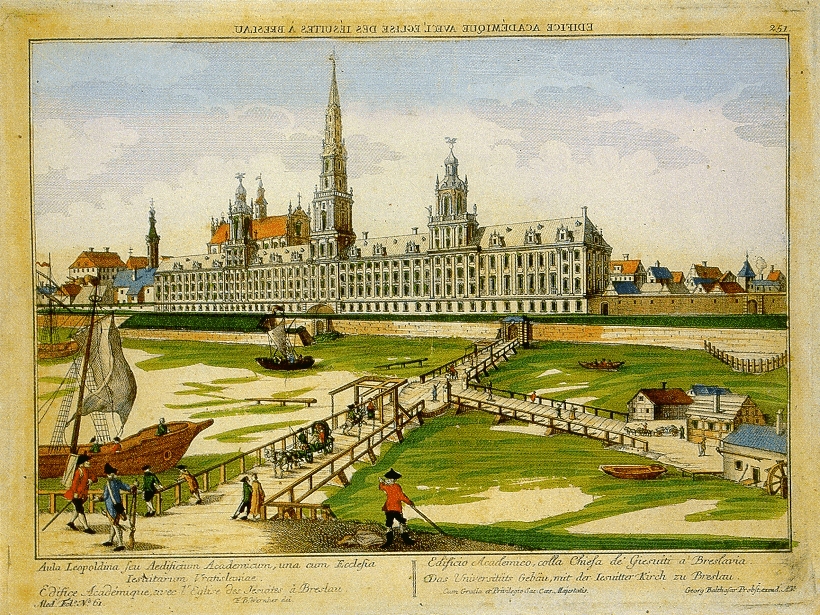|
Ferdinand Lassalle
Ferdinand Lassalle (; 11 April 1825 – 31 August 1864) was a Prussian-German jurist, philosopher, socialist and political activist best remembered as the initiator of the social democratic movement in Germany. "Lassalle was the first man in Germany, the first in Europe, who succeeded in organising a party of socialist action", or, as Rosa Luxemburg put it: "Lassalle managed to wrestle from history in two years of flaming agitation what needed many decades to come about." As agitator he coined the terms night-watchman state and iron law of wages. Biography Early life Lassalle was born Ferdinand Johann Gottlieb Lassal on 11 April 1825 in Breslau, Silesia (now Wrocław, Poland). His father Heyman Lassal was a Jewish silk merchant and intended his son for a business career, sending him to the commercial school at Leipzig. However, Lassalle soon transferred to university, studying first in the University of Breslau and later at the University of Berlin. There, Lassalle stud ... [...More Info...] [...Related Items...] OR: [Wikipedia] [Google] [Baidu] |
German Confederation
The German Confederation (german: Deutscher Bund, ) was an association of 39 predominantly German-speaking sovereign states in Central Europe. It was created by the Congress of Vienna in 1815 as a replacement of the former Holy Roman Empire, which had been dissolved in 1806. The Confederation had only one organ, the Federal Convention (also Federal Assembly or Confederate Diet). The Convention consisted of the representatives of the member states. The most important issues had to be decided on unanimously. The Convention was presided over by the representative of Austria. This was a formality, however, the Confederation did not have a head of state, since it was not a state. The Confederation, on the one hand, was a strong alliance between its member states because federal law was superior to state law (the decisions of the Federal Convention were binding for the member states). Additionally, the Confederation had been established for eternity and was impossible to dissolve ... [...More Info...] [...Related Items...] OR: [Wikipedia] [Google] [Baidu] |
Philology
Philology () is the study of language in oral and written historical sources; it is the intersection of textual criticism, literary criticism, history, and linguistics (with especially strong ties to etymology). Philology is also defined as the study of literary texts as well as oral and written records, the establishment of their authenticity and their original form, and the determination of their meaning. A person who pursues this kind of study is known as a philologist. In older usage, especially British, philology is more general, covering comparative and historical linguistics. Classical philology studies classical languages. Classical philology principally originated from the Library of Pergamum and the Library of Alexandria around the fourth century BC, continued by Greeks and Romans throughout the Roman/Byzantine Empire. It was eventually resumed by European scholars of the Renaissance, where it was soon joined by philologies of other European ( Germanic, Celtic), Eur ... [...More Info...] [...Related Items...] OR: [Wikipedia] [Google] [Baidu] |
Humboldt University Of Berlin
Humboldt-Universität zu Berlin (german: Humboldt-Universität zu Berlin, abbreviated HU Berlin) is a German public research university in the central borough of Mitte in Berlin. It was established by Frederick William III on the initiative of Wilhelm von Humboldt, Johann Gottlieb Fichte and Friedrich Ernst Daniel Schleiermacher as the University of Berlin () in 1809, and opened in 1810, making it the oldest of Berlin's four universities. From 1828 until its closure in 1945, it was named Friedrich Wilhelm University (german: Friedrich-Wilhelms-Universität). During the Cold War, the university found itself in East Berlin and was ''de facto'' split in two when the Free University of Berlin opened in West Berlin. The university received its current name in honour of Alexander and Wilhelm von Humboldt in 1949. The university is divided into nine faculties including its medical school shared with the Freie Universität Berlin. The university has a student enrollment of ar ... [...More Info...] [...Related Items...] OR: [Wikipedia] [Google] [Baidu] |
University Of Wrocław
, ''Schlesische Friedrich-Wilhelms-Universität zu Breslau'' (before 1945) , free_label = Specialty programs , free = , colors = Blue , website uni.wroc.pl The University of Wrocław ( pl, Uniwersytet Wrocławski, UWr; la, Universitas Wratislaviensis) is a public research university in Wrocław, Poland. It is the largest institution of higher learning in Lower Silesian Voivodeship, with over 100,000 graduates since 1945, including some 1,900 researchers, among whom many have received the highest awards for their contributions to the development of scientific scholarship. Renowned for its high quality of teaching, it was placed 44th by ''QS World University Rankings'': EECA 2016, and is situated on the same campus as the former University of Breslau, which produced 9 Nobel Prize winners. The university was founded in 1945, replacing the previous German University of Breslau. Following the territorial changes of Poland's borders, academics primarily ... [...More Info...] [...Related Items...] OR: [Wikipedia] [Google] [Baidu] |
Leipzig
Leipzig ( , ; Upper Saxon: ) is the most populous city in the German state of Saxony. Leipzig's population of 605,407 inhabitants (1.1 million in the larger urban zone) as of 2021 places the city as Germany's eighth most populous, as well as the second most populous city in the area of the former East Germany after (East) Berlin. Together with Halle (Saale), the city forms the polycentric Leipzig-Halle Conurbation. Between the two cities (in Schkeuditz) lies Leipzig/Halle Airport. Leipzig is located about southwest of Berlin, in the southernmost part of the North German Plain (known as Leipzig Bay), at the confluence of the White Elster River (progression: ) and two of its tributaries: the Pleiße and the Parthe. The name of the city and those of many of its boroughs are of Slavic origin. Leipzig has been a trade city since at least the time of the Holy Roman Empire. The city sits at the intersection of the Via Regia and the Via Imperii, two important medieval ... [...More Info...] [...Related Items...] OR: [Wikipedia] [Google] [Baidu] |
Silk
Silk is a natural protein fiber, some forms of which can be woven into textiles. The protein fiber of silk is composed mainly of fibroin and is produced by certain insect larvae to form cocoons. The best-known silk is obtained from the cocoons of the larvae of the mulberry silkworm ''Bombyx mori'' reared in captivity ( sericulture). The shimmering appearance of silk is due to the triangular prism-like structure of the silk fibre, which allows silk cloth to refract incoming light at different angles, thus producing different colors. Silk is produced by several insects; but, generally, only the silk of moth caterpillars has been used for textile manufacturing. There has been some research into other types of silk, which differ at the molecular level. Silk is mainly produced by the larvae of insects undergoing complete metamorphosis, but some insects, such as webspinners and raspy crickets, produce silk throughout their lives. Silk production also occurs in hymenoptera ... [...More Info...] [...Related Items...] OR: [Wikipedia] [Google] [Baidu] |
Iron Law Of Wages
The iron law of wages is a proposed law of economics that asserts that real wages always tend, in the long run, toward the minimum wage necessary to sustain the life of the worker. The theory was first named by Ferdinand Lassalle in the mid-nineteenth century. Karl Marx and Friedrich Engels attribute the doctrine to Lassalle (notably in Marx's 1875 ''Critique of the Gotha Program''), the idea to Thomas Malthus's ''An Essay on the Principle of Population,'' and the terminology to Goethe's "great, eternal iron laws" in '' Das Göttliche''. It was coined in reference to the views of classical economists such as David Ricardo's law of rent, and the competing population theory of Thomas Malthus. It held that the market price of labor (which tends toward the minimum required for the subsistence of the laborers) would always, or almost always, reduce as the working population increased and vice versa. Ricardo believed that this happened only under particular conditions. Lassalle Acc ... [...More Info...] [...Related Items...] OR: [Wikipedia] [Google] [Baidu] |
Night-watchman State
A night-watchman state, or minarchy, whose proponents are known as minarchists, is a model of a state that is limited and minimal, whose functions depend on libertarian theory. Right-libertarians support it only as an enforcer of the non-aggression principle by providing citizens with the military, the police, and courts, thereby protecting them from aggression, theft, breach of contract, fraud, and enforcing property laws.Gregory, Anthony (May 10, 2004)"The Minarchist's Dilemma" ''Strike the Root: A Journal of Liberty''. . Retrieved February 1, 2020.Peikoff, Leonard (March 7, 2011)"What role should certain specific governments play in Objectivist government?" Peikoff.com. Retrieved January 2, 2020. In the United States, this form of government is mainly associated with libertarian and Objectivist political philosophy. In other countries, minarchism is also advocated by some non-anarchist libertarian socialists and other left-libertarians.Hain, Peter (July/August 2000)" ... [...More Info...] [...Related Items...] OR: [Wikipedia] [Google] [Baidu] |
Rosa Luxemburg
Rosa Luxemburg (; ; pl, Róża Luksemburg or ; 5 March 1871 – 15 January 1919) was a Polish and naturalised-German revolutionary socialism, revolutionary socialist, Marxism, Marxist philosopher and anti-war movement, anti-war activist. Successively, she was a member of the Proletariat (party), Proletariat party, the Social Democracy of the Kingdom of Poland and Lithuania (SDKPiL), the Social Democratic Party of Germany (SPD), the Independent Social Democratic Party of Germany, Independent Social Democratic Party (USPD), the Spartacus League (), and the Communist Party of Germany (KPD). Born and raised in an assimilated Jewish family in Poland, she became a German citizen in 1897. After the SPD supported German involvement in World War I in 1915, Luxemburg and Karl Liebknecht co-founded the anti-war Spartacus League () which eventually became the KPD. During the German Revolution of 1918–19, November Revolution, she co-founded the newspaper (''The Red Flag''), the central ... [...More Info...] [...Related Items...] OR: [Wikipedia] [Google] [Baidu] |
Social Democracy
Social democracy is a political, social, and economic philosophy within socialism that supports political and economic democracy. As a policy regime, it is described by academics as advocating economic and social interventions to promote social justice within the framework of a liberal-democratic polity and a capitalist-oriented mixed economy. The protocols and norms used to accomplish this involve a commitment to representative and participatory democracy, measures for income redistribution, regulation of the economy in the general interest, and social welfare provisions. Due to longstanding governance by social democratic parties during the post-war consensus and their influence on socioeconomic policy in Northern and Western Europe, social democracy became associated with Keynesianism, the Nordic model, the social-liberal paradigm, and welfare states within political circles in the late 20th century. It has been described as the most common form of Western ... [...More Info...] [...Related Items...] OR: [Wikipedia] [Google] [Baidu] |
Political Activist
A political movement is a collective attempt by a group of people to change government policy or social values. Political movements are usually in opposition to an element of the status quo, and are often associated with a certain ideology. Some theories of political movements are the political opportunity theory, which states that political movements stem from mere circumstances, and the resource mobilization theory which states that political movements result from strategic organization and relevant resources. Political movements are also related to political parties in the sense that they both aim to make an impact on the government and that several political parties have emerged from initial political movements. While political parties are engaged with a multitude of issues, political movements tend to focus on only one major issue. Political movement theories Some of the theories behind social movements have also been applied to the emergence of political movements in spec ... [...More Info...] [...Related Items...] OR: [Wikipedia] [Google] [Baidu] |








